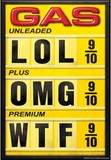This article is hits it out of the park. Just because we had an accident in the Gulf doesn't mean that we should stop all drilling off the coast. It means that we should figure out what went wrong and fix it! That is unless you want to pay $5.00 for gas!
Spillover effect can’t be less drilling
It has now been a year since an oil rig in the Gulf of Mexico blew out, killing 11 workers and eventually spewing 172 million gallons of crude oil into the sea. Much has transpired since the disaster, both positive and negative.
On the positive side, the widely-predicted environmental disaster has not materialized. The combination of man-made efforts to contain the spill and the earth’s own resiliency in the face of both natural and man-caused environmental disasters have limited the effects of the accident. The environmental damage should not be minimized but the effects have fallen far short of what many experts expected.
At the same time, the U.S. government has tightened its oversight of offshore exploration and drilling while the oil and gas industry has moved quickly to modify its approach to safety and to reconcile oil production with environmental practices.
For instance, major oil companies have developed a joint fast-response capability for containing spills as well as a research team to produce a foolproof blowout preventer for industrywide use. In addition, the oil industry has created a new Center for Offshore Safety designed to ensure that audits are rigorous and best drilling practices are employed by all companies engaged in high-risk offshore production.
While the American public knows very little about the positive developments, they confront the negative developments every day at the gas pump.
The price of crude oil has traded for well over $100 a barrel for some time now. World demand, driven primarily by economic growth in China and India, will keep the price of crude oil high unless supplies are also increased.
Domestically, gasoline prices now hover around $4 a gallon, having risen nearly 30 cents per gallon in just the last month. With the onset of the summer driving season, demand for gasoline is likely to drive the price even higher.
Unfortunately, the Obama administration has not acquitted itself particularly well when it comes to increasing domestic supplies of crude oil. An analysis of projections by the Department of Energy (DOE) reveals that under President Barack Obama’s policies, oil production from federal lands and offshore sites in 2010 was 136.8 million barrels less — 16 percent — than what DOE predicted in 2007.
But that’s not all. Analysts predict that Obama’s energy policies will lead to a further dramatic decrease in oil production on federal lands in the future. The agency estimates that oil production in federal lands and the Gulf of Mexico will fall by 15 percent in 2011 and will decline by 26 percent in 2012 from the 2010 production high.
Although the Obama administration lifted the offshore drilling moratorium several months ago, the government has been slow to approve deepwater drilling permits and the regulatory environment remains unclear. As a result, drilling contractors have shifted their rigs from the Gulf to sites off the coasts of Brazil and West Africa.
The Gulf supplies 1.7 million barrels a day, accounting for a third of the nation’s domestic oil production, and 10 percent of natural gas, mostly from the deepwater region, providing 400,000 jobs from the oil and gas industry itself and from industries that support it. Last year it generated $70 billion for the Gulf states, while delivering $20 billion a year in tax revenue and royalty payments to all levels of government.
Last year’s offshore drilling disaster rightfully raised serious environmental and safety concerns, but they have been addressed. It is now time for the administration to take concrete steps not only to increase the production of oil and gas in the Gulf of Mexico but also to exploit other domestic sources.
Mackubin Thomas Owens teaches at the Naval War College in Newport, R.I.

I wish they would drill everywhere they can to help lessen our dependence on foreign oil and lower our price at the pump! And that's the All Right Idea!